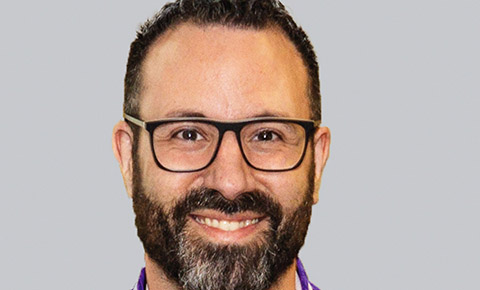SESP Professor Named Co-Chair of Illinois Holocaust and Genocide Commission

Northwestern University’s Danny M. Cohen (PhD11) has been appointed co-chair of the Illinois Holocaust and Genocide Commission, a 17-member team of scholars, educators, and practitioners focused on Holocaust, genocide, and social justice education, and commemoration.
Cohen, a learning scientist, education designer will co-chair the group with Kelley Szany, vice president of education and exhibitions at Illinois Holocaust Museum.
“Danny’s work is an inspiring example of what drives work in the Learning Sciences program - bringing together multiple disciplinary perspectives to inform innovations in learning that matter for people’s lives,” said Brian Reiser, professor of learning sciences in the School of Education and Social Policy, who served as Cohen’s adviser.
Under his co-leadership, commissioners “will help districts, schools, and teachers access high quality resources to improve instruction and engage young people about histories of genocide and atrocities today,” said Cohen, associate professor of instruction at Northwestern’s School of Education and Social Policy. “We hope to raise public consciousness about emerging and ongoing genocides.”
The School of Education and Social Policy, which focuses on learning, leadership, and policy, is well represented on the Commission. In addition to Cohen, Illinois Gov. JB Pritzker appointed alumna and Chicago Public Schools’ teacher Sammi Oberman (BS19), and current student Charlotte Masters, both of whom have worked in the Holocaust and social justice education fields.
Other newly appointed commissioners with Northwestern ties include Kellogg School of Management alumna Susan Abram, CEO of the Illinois Holocaust Museum & Education Center; Sarah Cushman, director of the Holocaust Educational Foundation of Northwestern and a lecturer in the History Department in Weinberg College; and Doug Kiel, assistant professor of history at the Alice Kaplan Institute for the Humanities.
The lone high school representative, Jack Goodman, has spent the last year and a half interning with Unsilence, a human rights education non-profit developed and founded by Cohen.
In 1990, Illinois became the first state in the country to mandate the study of Holocaust history for public elementary and high schools. The Illinois General Assembly expanded the act to include other cases of genocide and in 2010, passed the Illinois Holocaust and Genocide Commission Act.
Cohen, a Charles Deering McCormick Distinguished Professor of Instruction and an inaugural appointee of the Commission, teaches about Holocaust education design, Holocaust memory, fiction, and film, pedagogies for history and injustice, and design for social change.
Unsilence, based on his research, uses the hidden stories of human rights abuses and the sharing of experiences to confront and ultimately repair some of our most vexing social problems.
“We can’t take action on racism, gun violence, or lack of access to mental health care unless we talk about it,” Cohen said in SESP magazine. “First comes the stories, then the talking, then the action.”
Unsilence started in 2014 with a handful of participants. Today, more than 15,000 students, educators, and ordinary citizens have participated in the initiative, ranging from Chicago Public Schools to Yad Vashem in Israel.
Cohen the grandson of a Holocaust survivor, was an advisory board member for the journal The Holocaust in History in Memory and was a faculty fellow of the Auschwitz Jewish Center. He also designed the pedagogical track of the inaugural docent training program of Illinois Holocaust Museum and Education Center.
“He is an extremely talented teacher – an empathetic listener and gentle–if factually firm– instructor,” said Phyllis Lassner, professor emerita at Northwestern, who co-taught a seminar about Children and the Holocaust with Cohen when he was a graduate student. Later, the two coauthored an article on Holocaust fiction for young adults.
“He is also a gifted scholar and writer,” Lassner said. “Danny’s combination of talents continues to bring enormous benefits to his mentoring, Holocaust, and human rights work.”
Cohen’s human rights fiction includes the choose-your-own-pathway mystery The 19th Window, the short story Dead Ends, and the historical novel Train, a teacher fellows selected text of the United States Holocaust Memorial Museum.
Cohen had Commission members Oberman and Masters in his classes and said both have taught him a great deal though class participation and their work on projects.
Oberman is a learning specialist at The Noble Academy in Chicago, and a graduate student at the Relay Graduate School of Education, where she is earning a master's degree in teaching with an endorsement in Special Education. As an undergraduate student, Oberman’s honors thesis looked at the influence of human rights education on student empathy.
She played a critical role in curriculum development at Unsilence and co-designed "Hidden," a collection of interactive experiences on Hidden Holocaust Histories for learning, commemoration, and empathy. She has also facilitated Holocaust education workshops both live and in the virtual setting across the country.
“Sammi is a talented educator and facilitator,” Cohen said. “Her work as an education designer, especially the support materials she created for teachers, is being used by educators across the country.Masters, the granddaughter of a Holocaust survivor, has taken Cohen’s classes on Holocaust memory and Holocaust film and has spent the last six years working on various initiatives geared towards Holocaust education and curriculum development.
As a high school sophomore, she traveled to Poland for the 70th anniversary of the liberation of Auschwitz. There she met Paula Lebovics, a survivor liberated from Birkenau at age 11 who told her ‘How I wish I could spend the rest of my days sharing my story with more young people like you.’
“Being on this Commission feels like a powerful step towards making that knowledge more accessible to students everywhere,” Masters said. “As the granddaughter of a Holocaust survivor, I feel a strong responsibility to carry on my grandma’s story and those of other survivors as well as to continue developing tools to support tolerance education.”